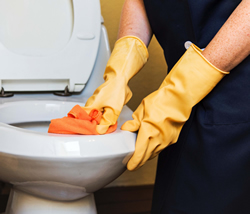Emily Stewart* says the happiest households are those where the housework is shared equally, but the most economic option might be to outsource.
 It’s the weekend.
It’s the weekend.
Instead of sleeping in, taking the kids to the park, or working the morning shift, you’re cleaning.
It’s mostly repetitive, boring, dirty work, but it has to be done to keep the household running.
And, it must be said, it usually falls to women.
Australian women spend up to 14 hours a week doing unpaid domestic housework, according to the latest Census.
The average man does just five hours.
“Everyone uses the toilet, walks on the floors, dirties the dishes, but it ends up being women who are responsible for the bulk of the housework,” says Melbourne University sociologist Dr Leah Ruppanner.
“My own research has found couples have the highest satisfaction, and are less likely to divorce, where housework is shared equally,” she says.
But depending on your situation, there may be a third way: outsource the problem.
“Why spend the weekend fighting with my husband about who is going to do the cleaning?” says Dr Ruppanner.
“It’s an expense that feels luxurious, but paying for a cleaner might be much cheaper in the long run than paying for a divorce.”
So, could it be time to hire help?
Do your sums
“The way an economist would look at this decision is: How much could I make per hour if I were working rather than cleaning my own house?” says Dr Gigi Foster, an economist with the UNSW Business School.
The first step is to work out how much a cleaner will cost.
The award wage for a full-time cleaner is around $20 an hour, but if it’s a casual arrangement, it’s more realistic to pay between $30 and $50 an hour.
If you could earn more than what you would pay the cleaner, it may be the rational economic choice.
But the choice is not only monetary.
The benefits of leaving cleaning to the experts
Outsourcing is not just about avoiding cleaning — you can tell yourself you’re doing it for the country.
“You’re creating wealth if you hire a cleaner, because the work counts towards GDP [gross domestic product],” says Dr Foster.
“And it might have a double impact if it releases the person who would otherwise be cleaning [i.e. you] into the labour market.”
It might also create more goods and services for the economy as a whole.
According to economic theory, total production is highest when everyone specialises in what he or she is best at.
Tally up how much time it would take you to clean your own house.
Would a professional cleaner be faster at the job, for instance taking two hours for a job that would take you five hours?
If so, keep your day job and leave the cleaning to the experts.
But what if you’re more likely to spend that extra time with family, playing sport or watching Netflix, rather than working?
Place a value on those activities and think about whether your five hours of time is worth more than paying a cleaner for two hours.
Even if the sums work out, there are benefits to doing it yourself
In her own life, economist Dr Gigi Foster doesn’t live by the rational economic approach.
“I clean my own house, even though I earn a lot of money,” says Dr Foster.
“I feel it’s a good thing to model for my children, that cleaning is a respectable activity.”
“And I actually enjoy it.”
And if you can’t afford a cleaner, she has this advice.
“Children are a vastly undertapped source of assistance around the house.”
“It’s good training for them and it takes pressure off the household.”
A cleaner tells us the dos and don’ts
The domestic industry is not unionised and is largely unregulated — and there is no domestic cleaning industry association.
The work is mostly unskilled and often cash-in-hand.
And the cleaning industry more broadly has been in the spotlight for instances of poor working conditions and pay.
Eniko Sgouros started her cleaning business in Melbourne four years ago.
She found it hard to find an office job that had flexible hours to fit around her childcare needs.
Eniko says the best way to find a good cleaner is through recommendations, either online or through friends.
“You must make sure whomever you do choose has public liability insurance and a police check,” she says.
“Ask to see this at their first visit.”
So, you’ve found a cleaner who seems like a good fit — what should you expect them to actually do?
“My service includes the cleaning of all rooms, bathrooms, kitchen, bedrooms,” says Eniko.
“That means mopping and vacuuming of all floors, dusting, cleaning all surfaces like countertops and sinks and removal of cobwebs.”
She says clients should make sure everything is picked up off the floor before the cleaner comes.
Spring cleaning, window cleaning and oven cleaning are usually billed separately.
“Cooking, making beds and doing laundry are not part of my cleaning tasks,” says Eniko.
If cleaning is a constant source of tension, or you’re sick of spending your weekends vacuuming and mopping, remember there’s another option.
And it might just be great value for money.
* Emily Stewart is the Melbourne reporter for The Business at the ABC.
This article first appeared at www.abc.net.au.




